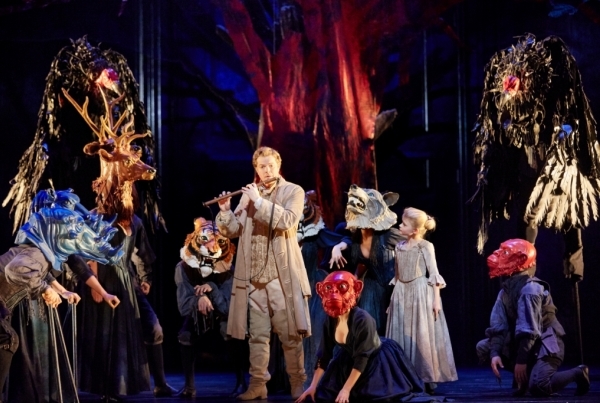Die Zauberflöte (Royal Opera House) – 'shimmering'

© Mark Douet
Toby Spence is in equally fine voice for his first Covent Garden Tamino, a role he assumed some years back in Nicholas Hytner‘s lamented ENO production. The tenor’s plangent singing helps add a missing third dimension to what must surely be Mozart’s most lamely characterised leading man.
But then Die Zauberflöte is a 'Singspiel' – a popular entertainment – and thus not to be taken too seriously, although the dubious social attitudes the composer and his librettist Emanuel Schikaneder promulgate within it can be hard to swallow nowadays.
True to the maxim ‘if it ain’t broke, don’t fix it’, the Royal Opera has brought back David McVicar‘s shimmering Age of Enlightenment production for its umpteenth revival since 2003. McVicar has re-directed it himself this time, assisted by Thomas Guthrie, and it retains all its fabulous strengths and, alas, its two glaring weaknesses: the near non-direction of Tamino (he wanders around a lot, brooding vaguely) and the lunchtime-drama-club embarrassment of his trials by fire and water.
"freshness and inventiveness"
For the rest, from the glowing orbs that are carried ceremoniously through the auditorium during the overture to the massive sun that rolls on in celebration of our heroes’ final triumph, this Magic Flute is a chiaroscuro delight. McVicar doesn’t overplay the Enlightenment card; instead he and designer John MacFarlane use the era’s pioneering fascination with science as a palette from which to conjure some enchanting visual moods.
Cornelius Meister, who conducted a good Bohème here a couple of years back, excels himself with a well judged reading of Mozart’s score. His speeds are fastish yet he’s not afraid to adopt a more deliberate tempo when it enhances the dramatic picture to do so. The ROH Orchestra, on fine form, brings out all the music’s freshness and inventiveness.
The Moor Monostatos, whitened here into a relic from The Addams Family, is played with leering definition by Colin Judson, while Georg Zeppenfeld gives Sarastro such gravitas that his exhortation to "beware the wiles of women" sounds almost reasonable. How strange it is that companies will clean up historic racism but not sexism.
That chief woman of wiles, The Queen of the Night, is a pig of a role whose coloratura goes from nought to 90 in seconds – twice. A single shaky top note aside, Anna Siminska defeated some first-night vocal tightness to hit the heights in more ways than one, while her three ladies, Sinéad Mulhern, Nadezhda Karyazina and Claudia Huckle, provided an excellent backing trio.
The evening’s star turn, though, comes from Austrian baritone Markus Werba who sings, speaks and gurns a priceless Papageno. Werba’s inventive physicality is hilarious and his two big duets, "Bei Männern, welche Liebe fühlen" with Pamina and "Pa pa pa" with Rhian Lois‘s slinky tease of a Papagena, are showstoppers.










